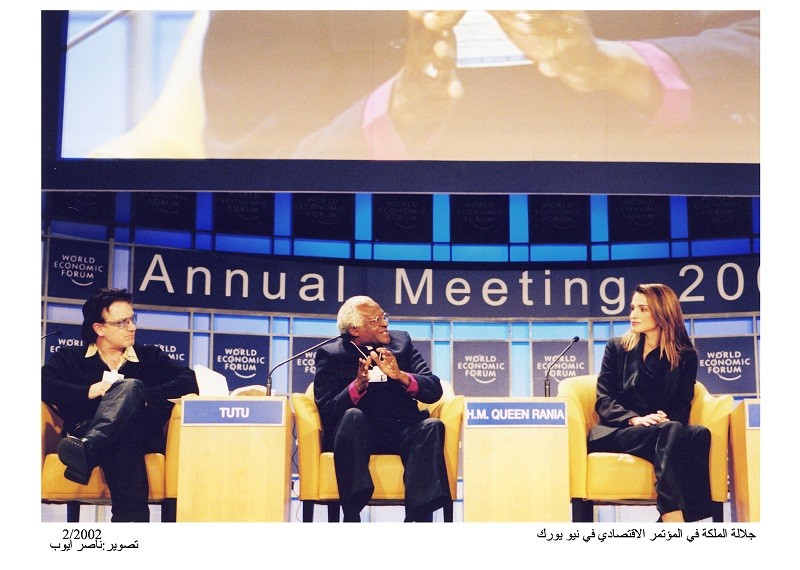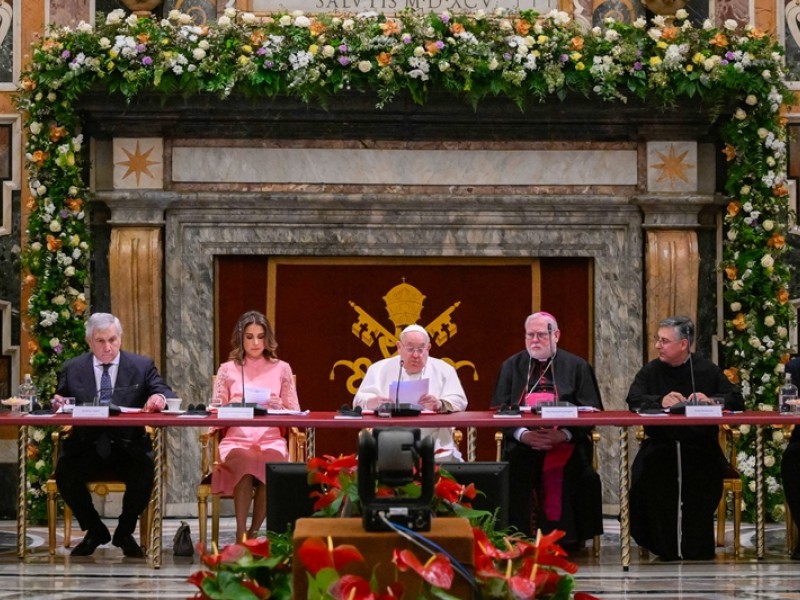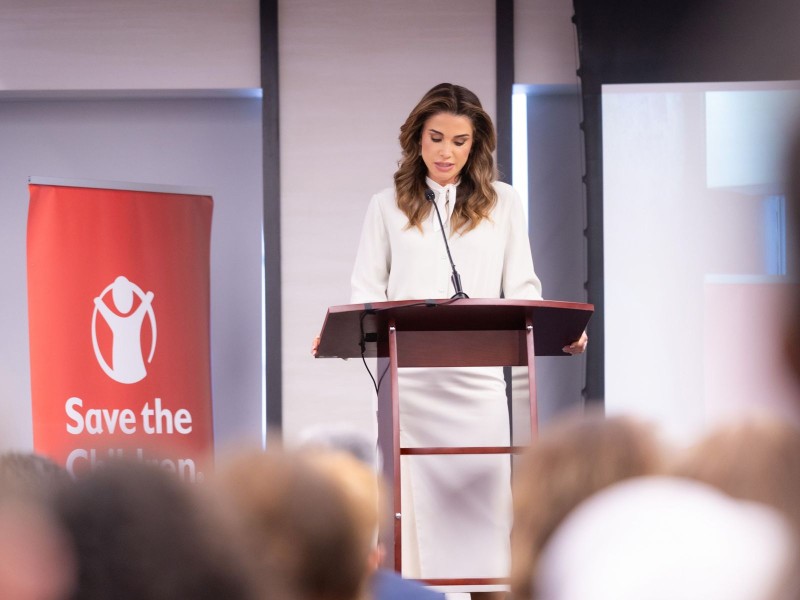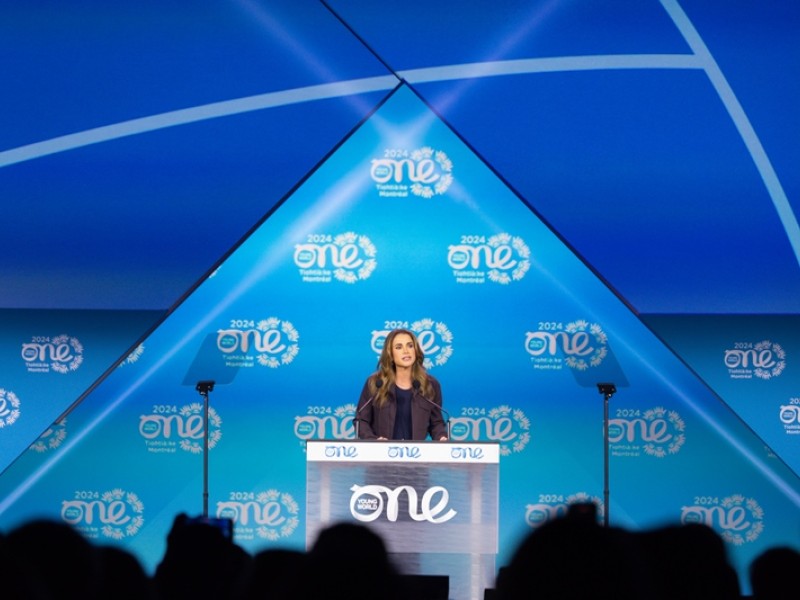Queen Rania’s Participation in the 2002 World Economic Forum Opening Plenary Session - NY, USA

Charlie Rose: I am pleased to have the opportunity to share the thoughts of Her Majesty Queen Rania of Jordan. We think about culture and modernity, and we think about civilizations and contributions, and we think about the future. What is it that you think is important from a perspective of someone who has lived in different countries, had different experiences, and, after the death of King Hussein, had new responsibilities set on you and your husband? What is it that you think is important for us to understand about the Middle East today, and your own experience?
Queen Rania: As you said, there is a special mood of the world where there is a global moral consciousness, if you will…a feeling that we want to know about what’s going on in the rest of the world, that we care. I believe that is positive development, and it’s something that we really need to build on. There is genuine intrigue and curiosity now from different civilizations wanting to know about each other. And it’s important for us to engage in a sustained dialogue, to try to understand the intricacies and complexities, and the internal dynamics of our different civilizations. Only then can we really reach an understanding and try to deal with the root causes that have resulted in some of the conflicts that take place in our part of the world.
One thing I’ve noticed is that there is a danger of a bi-polar view of the world, a subliminal segregation of our world – of ‘us’ versus ‘them.’ And that is a very dangerous development. When people look at my part of the world, for instance, sometimes they look at it as a homogenous type of society, forgetting that the 1.2 billion Muslims are spread over different countries, regions, and continents, speaking different languages, and coming from different socio-economic classes. We really need to reach out and try to understand all the different intricacies and complexities of our world, and then maybe try to deal with issues.
There has been a lot of violence in our part of the world, and maybe many things have gone wrong that have led to that violence. But I can tell you that Islam is not one of them. Islam is a religion that is not contrary to modernity. It is in fact compatible with democracy. So in order to try to deal with the violence, we really need to look at some of the root causes, and I believe that those are more economical, ideological, social issues. Many people of our part of the world feel a battle – they feel that they have an identity crisis, trying to really come to terms with our global world and define their own identity and religion. We’re still struggling with that, and we really need to continuously feel a part of the world and come to terms with the issues.
Overall, I still believe that humanity has made progress. If you look at our world today, as you mentioned, people know more about the rest of the world, and they care about poverty, about conflict. We cannot turn a blind eye to the problems of the Middle East. That’s something I think we’ve learned after September 11. Any grievances in any part of the world could come back to haunt us, so it’s important for us to really look at these issues and try to find long-term and comprehensive solutions to them.
Charlie Rose: What is it that each of you is thinking should come out of this World Economic Forum, here in New York over the next three days? What would you like to see accomplished here, other than those meetings that we all enjoy in the halls as we get to know people and share?
Queen Rania: I think it’s important to figure out a way to really make use of this general mood that we have today in the world, this sense of common humanity, and translate it into something on the ground. Today’s world, this global world, has given us new tools: technology, long-distance learning, media, free trade, broadband connectivity, strong international organizations... We still haven’t figured out the best way to use these tools in the most efficient way, and that’s why we have these protests outside. We just need to figure out a way of knowing which tools to pull out when, in order to achieve more equality in the world, to deal with the problems of poverty, and health problems, etc. This is something I think will be a very strong development of this forum.
Charlie Rose: James Wolfensohn, the President of the World Bank, spoke yesterday, and laid out a challenge to the developed world to give a lot more in terms of handing out money, billions of dollars that he did not see coming and he was chastising. I’d like to hear some of you reflect on what is expected of the United States, the most powerful country in the world – certainly militarily the most powerful country in the world – coming out of September 11? What is the role of leadership among nations as well as individuals?
Queen Rania: Well, we said earlier that mankind has made progress. And inevitably a superpower is testament to that. Traditionally, a superpower is viewed as prominent, trying to put its own interests above all else. Now what is expected from a superpower is to be able to do good for mankind in general, to reach out to countries. The United States, I believe, is expected to exercise its moral authority to make sure that there is equality in the world…to use the tools available to it to ensure equity. And I believe that this ability to make such a large impact on the world should be used as an opportunity rather than a responsibility. I believe that the United States does have a good opportunity to make the world a better place.
Charlie Rose: Have any of you seen any lessening of the effort and the urgency that came out of September 11? Here we are, at the end of January, about to enter a new month, not that many months away from September. This effort, this battle to make a difference, is there any lessening of that?
Queen Rania: I think the world resolve to fight terrorism is still there, and it’s still strong. But I am not sure that this covers all the fronts. For example, I’d really like to see increased engagement in the Middle East. It’s a very dangerous situation, and it’s the most dangerous it’s ever been. And we really need to be able to encourage the two parties who are so entrenched in violence, and to try to think of alternative ways to help them think of alternatives. We need to encourage them to change their discourse and to try to occupy the higher moral ground.
We see quotes from Ghandi and Martin Luther King…those ideals for a non-violent approach to popular problems, and for dialogue and tolerance. Those are very effective means. And right now, we believe in the Middle East that those ideals are so far away; we need to bring them closer to the people. We need to be able to strengthen the peace camps on both sides; we must give them a voice, because we have seen in the past couple of years that they have been marginalized and literally weakened. We need to get in there and help them, because we have a whole generation now who know nothing but rage, and rage is a very dangerous feeling to have. And that obviously is a pre-requisite for terror and danger for the rest of the world.
Charlie Rose: The notion of globalization has been a driving force in our society. We have talked about poverty, we have talked about world health issues, and we have talked about terrorism. But has it changed at all, usually because of economics, protests, or other circumstances?
Queen Rania: Well, I don’t think globalization is a static thing – it’s a moving thing, and over the past period we’ve had to go through a process of tweaking or fine-tuning. It’s no longer just about commerce and speed and technology and investments. There is now a human element, a political element that comes with globalization. We know now that good ethics are good for shareholder value… there is a feeling of corporate citizenship. Multinationals are feeling the need to do well for their societies and their communities, and not only for their own societies but also those abroad, and they have the means and tools to really make a difference.
What we need to realize is globalization is a dynamic process, and it is changing. We’re trying to protect it, and this time hopefully we will; that way, we won’t have the protests that we’re seeing outside. Many of those protests are legitimate and we need to listen to them. There are the environmental issues…the humanitarian issues in particular situations. And we are heading in that direction. Ethics and morals are now high on the agenda of the global world.
Featured
Queen Rania's official website
This website does not support old browsers. To view this website, Please upgrade your browser to IE 9 or greater
Your browser is out of date. It has known security flaws and may not display all features of this and other websites. Learn how to update your browser



